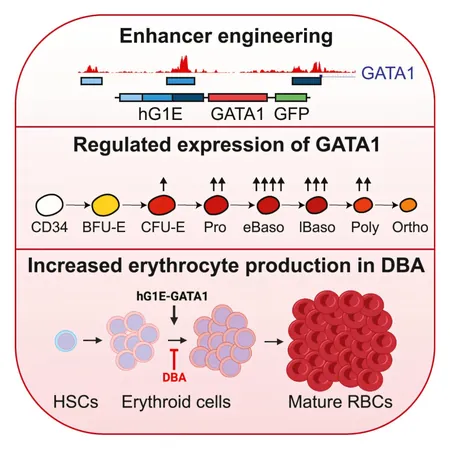
Breakthrough Study Reveals Complexity of Type 1 Diabetes Management: Why One Treatment Doesn't Fit All!
2024-11-27
Author: Daniel
Groundbreaking Insights from the University of Bristol
A groundbreaking study from the University of Bristol has dramatically altered our understanding of managing type 1 diabetes (T1D), revealing that factors outside of carbohydrates play a crucial role in regulating blood glucose levels. This research exposes serious gaps in current automated insulin delivery (AID) systems, which often overlook vital information needed for effective glucose regulation.
Unexpected Patterns in Insulin Requirements
The research team delved into the insulin delivery data of individuals with T1D using the advanced OpenAPS system. The findings highlighted unexpected patterns in insulin requirements, which are alarmingly prevalent alongside those that were previously established. This indicates that many patients might not be receiving the optimal care needed to manage their condition effectively.
Influence of Multiple Factors
Lead researcher Isabella Degen stated, 'Our results support the idea that blood glucose regulation is influenced by a myriad of factors beyond just carbohydrate intake.' She emphasized that without the capability to measure these additional influences—such as stress, exercise, and hormonal fluctuations—AID systems err on the side of caution, often leading to blood glucose levels that are too high or too low.
The Need for Personalized Medical Treatment
The implications of this research are profound. Type 1 diabetes is a life-long condition wherein the pancreas produces minimal to no insulin, necessitating careful management through insulin injection or pumps. Traditionally, patients must meticulously match their insulin dosage to the carbs they consume, a task already fraught with challenges. Now, the researchers' findings suggest that the complexity of T1D management goes far beyond simple carbohydrate counting.
Diversity in Insulin Needs
'This study underscores the diversity in insulin needs among individuals with T1D,' explained Degen. 'Incorporating a wider range of biological and behavioral factors into treatment plans could lead to significantly improved outcomes.' This highlights an urgent need for personalized medical treatment rather than a one-size-fits-all approach.
Enhancing Measurement and Analysis Methods
Furthermore, the team is committed to enhancing measurement and analysis methods to systematically incorporate these previously overlooked factors into clinical practice. Degen anticipates that precise metrics will pave the way for better forecasting of blood glucose levels, thus increasing the overall effectiveness of AID systems.
Innovative Algorithms for Complex Data
'We were taken aback by the variety of patterns we observed, even among a relatively uniform group of participants. It’s evident that diabetes management requires a tailored strategy, as each individual's needs can differ significantly,' she added.
Access to Long-term AID Datasets
The researchers are now focusing on the development of advanced analytical methods to decipher the complexities of real-life medical data, including handling patterns over time despite inconsistent data collection. They are particularly focused on creating innovative algorithms that will reveal nuanced insights from automated insulin delivery datasets.
Revolutionizing Type 1 Diabetes Management
To solidify these advancements, the research team is seeking access to long-term AID datasets that encompass various sensor measurements to truly grasp the different factors affecting insulin requirements among diverse T1D populations. This could represent a monumental step toward revolutionizing management of type 1 diabetes and positively impacting countless lives.
Stay Tuned for Updates
Stay tuned for more updates as this research unfolds—could the future of diabetes management be just around the corner?



 Brasil (PT)
Brasil (PT)
 Canada (EN)
Canada (EN)
 Chile (ES)
Chile (ES)
 España (ES)
España (ES)
 France (FR)
France (FR)
 Hong Kong (EN)
Hong Kong (EN)
 Italia (IT)
Italia (IT)
 日本 (JA)
日本 (JA)
 Magyarország (HU)
Magyarország (HU)
 Norge (NO)
Norge (NO)
 Polska (PL)
Polska (PL)
 Schweiz (DE)
Schweiz (DE)
 Singapore (EN)
Singapore (EN)
 Sverige (SV)
Sverige (SV)
 Suomi (FI)
Suomi (FI)
 Türkiye (TR)
Türkiye (TR)